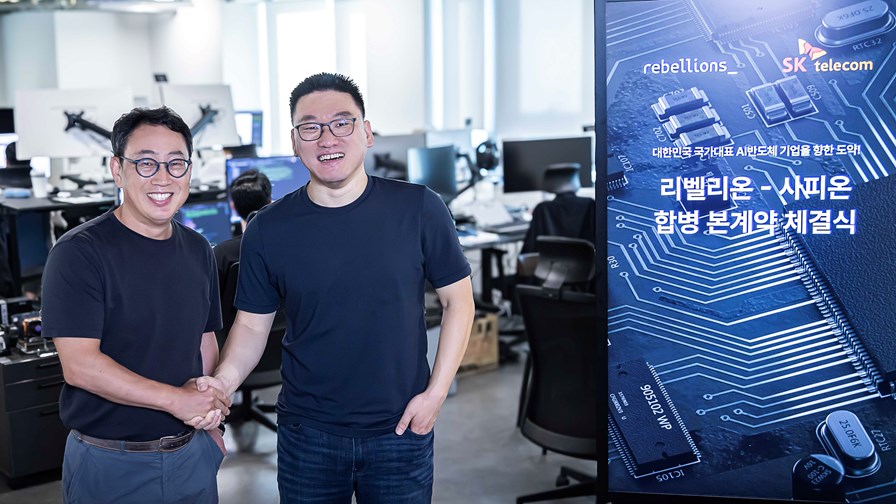
SK Telecom CEO Ryu Young-sang (left) and Rebellions CEO Park Seong-hyeon (right) celebrate the Sapeon/Rebellions merger deal.
- South Korea is determined to be at the forefront of all AI developments
- It doesn’t want to be left behind in the key area of AI chip development
- Two of the country’s developers of AI processors, one backed by SK Telecom and the other by KT, are merging to form a company valued at almost $750m
Sapeon, a South Korean AI chip developer spun out of network operator SK Telecom in 2016, has agreed to merge with one of its peers, Rebellions, to form a larger South Korean AI processor specialist that has a better chance of competing in the global market with the likes of Nvidia.
The companies have been in merger talks since June and have now agreed a formal merger deal that will create a company with a valuation of more than 1tn Korean won ($748m). Earlier this year Rebellions raised $124m in a funding round led by SK Telecom’s domestic telco rival KT Corp. and the raised a further $15m in July from the venture capital arm of Saudi Arabian oil giant Aramco.
The merged operation will operate under the Rebellions name and be run by Park Seong-hyeon, the current CEO of Rebellions. SK Telecom stated that once the deal is completed (it expects that to happen this year), it will “actively support the merged company's entry into the global AI semiconductor market and the enhancement of Korea's AI semiconductor competitiveness as a strategic investor.”
SK Telecom CEO Ryu Young-sang added “With the signing of this main contract, we will be able to significantly increase the global competitiveness of ‘AI semiconductors,’ one of the three major areas of the AI value chain that SK Telecom is building,” referencing the AI Pyramid Strategy outlined by the self-styled ‘AI company’ in September 2023. “SKT will continue to make preemptive investments and cooperate to leap forward as a leading global AI company,” the CEO added.
SK Telecom and Rebellions believe the next two years will be the “golden time” for South Korea to “gain an edge in the global AI semiconductor market,” the network operator noted in this announcement (in Korean).
The two companies already have AI chip designs in production: Sapeon has focused on the development of processors for large language model (LLM) processing, including the X330 that was launched in November 2023; while Rebellions already has an AI SoC (system on chip) called Atom in mass production and later this year plans to unveil a next-generation AI processor, dubbed Rebel, that will support large language model (LLM) processing.
- Ray Le Maistre, Editorial Director, TelecomTV
Email Newsletters
Sign up to receive TelecomTV's top news and videos, plus exclusive subscriber-only content direct to your inbox.




